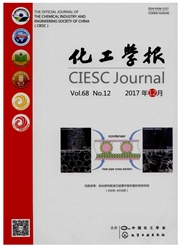

 中文摘要:
中文摘要:
引言 高级氧化技术是近年来处理难降解有机污染物的热点,其中电Fenton技术因其良好的有机污染物矿化效果日益受到重视。根据电Fenton过程产生·OH的方式不同,可将其分为3种类型口引:①阴极电Fenton法,其基本原理是O2在阴极还原为H2O2,
 英文摘要:
英文摘要:
The decomposition of H2O2 at the Ti-based oxide electrode coated with IrO2,RuO2 and TiO2 (Ti/ IrO2/RuO2/TiO2) prepared by thermal decomposition,was investigated in the electrolysis system of constant potential and the non-electrolysis system respectively.Additionally,the influence of the decomposition of H2O2 caused by Ti-based oxide electrode on the oxidation of aniline was also investigated.The results showed that both higher loading of oxides and higher pH were able to accelerate the decomposition of H2O2 in the non-electrolysis system and in this case the decay of H2O2 was mainly caused by the catalytic action of the oxides coating.In the electrolysis system with Ti-based oxides electrode as anode,the decay rate of H2O2 increased with increasing anodic potential.In this case,the decay of H2O2 involved two mechanisms: catalytic decomposition and electrochemical oxidation.It was also found that the catalytic decomposition of H2O2 at the oxides electrode was useless to the oxidation of aniline while the electrochemical oxidation of H2O2 was only slightly helpful to the oxidation of aniline.This work suggested that using the appropriate anodes of less H2O2 decomposition as well as reasonable potential in the electro-Fenton process could achieve high chemical efficiency of H2O2.
 同期刊论文项目
同期刊论文项目
 同项目期刊论文
同项目期刊论文
 Three advanced oxidation processes for the treatment of the wastewater from acrylonitrile production
Three advanced oxidation processes for the treatment of the wastewater from acrylonitrile production 期刊信息
期刊信息
